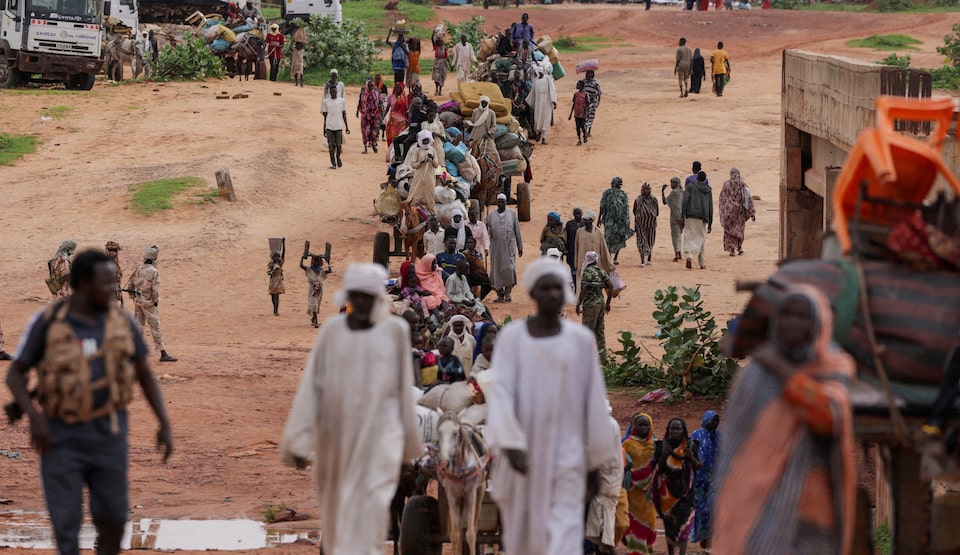Sudanese people, who fled the conflict in Murnei in Sudan’s Darfur region, cross the border between Sudan and Chad in Adre, Chad August 4, 2023. REUTERS

A volunteer at a Sudanese mobile kitchen prepares food at one of the displacement centers in New Halfa, Sudan, November 2, 2024. REUTERS
Summary
- Sudan halts participation in Integrated Food Security Phase Classification
- IPC report expected to show famine spreading to five areas in Sudan
- NGOs fear withdrawal undermines efforts to address hunger crisis
Dec 23 (Reuters) – The Sudanese government has suspended its participation in the global hunger-monitoring system on the eve of a report that’s expected to show famine spreading across the country, a step likely to undercut efforts to address one of the world’s largest hunger crises.
In a letter dated Dec. 23, the government’s agriculture minister said the government is halting its participation in the Integrated Food Security Phase Classification (IPC) system. The letter accused the IPC of “issuing unreliable reports that undermine Sudan’s sovereignty and dignity.”
On Tuesday, the IPC is expected to publish a report finding that famine has spread to five areas in Sudan and could expand to 10 by May, according to a briefing document seen by Reuters. “This marks an unprecedented deepening and widening of the food and nutrition crisis, driven by the devastating conflict and poor humanitarian access,” the document stated.
A spokesperson for the Rome-based IPC declined to comment.
Sudan’s withdrawal from the IPC system could undermine humanitarian efforts to help millions of Sudanese suffering from extreme hunger, said the leader of a non-governmental organization operating there, speaking on condition of anonymity.
“Withdrawal from the IPC system won’t change the reality of hunger on the ground,” the NGO source said. “But it does deprive the international community of its compass to navigate Sudan’s hunger crisis. Without independent analysis, we’re flying blind into this storm of food insecurity.”
A diplomat with Sudan’s mission to the United Nations in New York didn’t immediately respond to a request for comment on the move to cut off the IPC.
The IPC is an independent body funded by Western nations and overseen by 19 large humanitarian organizations and intergovernmental institutions. A linchpin in the world’s vast system for monitoring and alleviating hunger, it is designed to sound the alarm about developing food crises so organizations can respond and prevent famine and mass starvation.
IPC analysts typically partner with national governments to analyze data related to food insecurity and to report on conditions within a country’s borders. The government has headed the IPC’s analysis group in Sudan. But the system has increasingly struggled to function since civil war erupted in April 2023. The fighting between the army-backed government and its foe, the Rapid Support Forces (RSF) paramilitary, has disrupted data collection in areas held by both sides.
A recent Reuters investigation found that the Sudanese government obstructed the IPC’s work earlier this year, delaying by months a famine determination for the sprawling Zamzam camp for internally displaced people where some have resorted to eating tree leaves to survive.
Monday’s letter was addressed to the IPC and its Famine Review Committee, which vets and verifies a famine finding, as well as to diplomats. It says the forthcoming IPC report lacks updated malnutrition data and assessments of crop productivity during the recent summer rainy season. The growing season was successful, the letter says. It also notes “serious concerns” about the IPC’s ability to collect data from territories controlled by the RSF.
The IPC’s struggles go beyond Sudan. In a series of reports this year, Reuters has reported that authorities in Myanmar and Yemen have also tried to thwart the global hunger-monitoring process by blocking or falsifying the flow of data to the IPC or suppressing its findings.
In Myanmar, the IPC recently scrubbed from its website its assessment on hunger there, fearing for the safety of researchers. Reuters recently reported that representatives of the country’s ruling military junta have warned aid workers against releasing data and analysis showing that millions in Myanmar are experiencing serious hunger.
In Ethiopia, the government disliked an IPC finding in 2021 that 350,000 people were experiencing catastrophic acute food insecurity – so it stopped working with the IPC.
Alex de Waal, executive director of the World Peace Foundation at Tufts University’s Fletcher School, called Sudan’s move to stop cooperating with the IPC “both pathetic and tragic.”
“It’s part of a long history of the government of Sudan denying famine going back more than 40 years,” said de Waal, a leading specialist on famine. “Whenever there’s a famine in Sudan, they consider it an affront to their sovereignty, and they’re more concerned about their pride and their control than they are over the lives of their citizens.”
Reporting by Khalid Abdelaziz, Ryan McNeill, Nafisa Eltahir, Steve Stecklow and Lena Masri. Editing by Janet Roberts.





